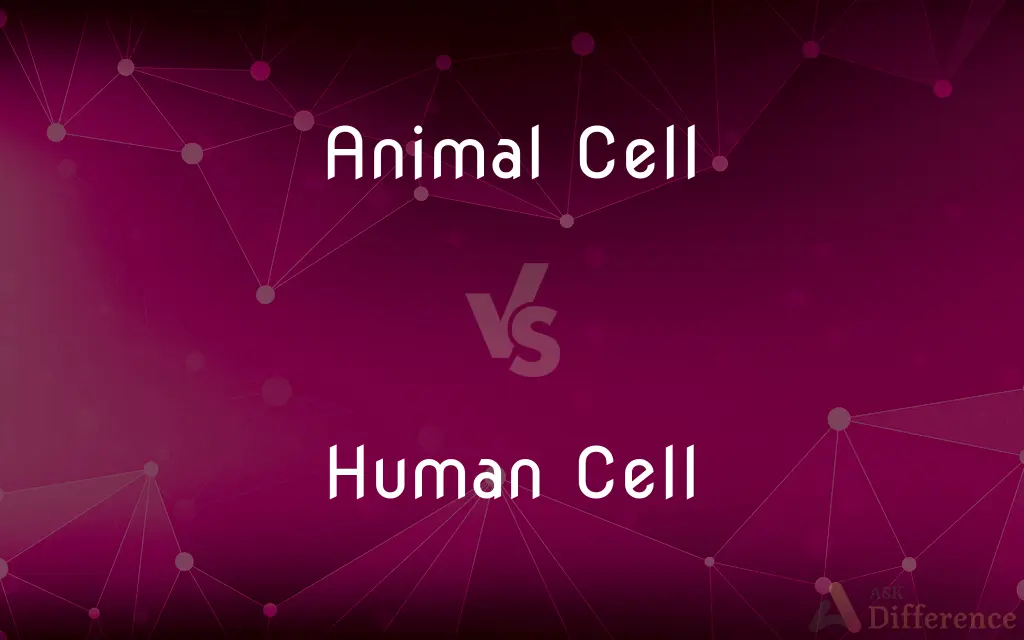Animal Cell vs. Human Cell — What's the Difference?
By Tayyaba Rehman — Published on November 3, 2023
An Animal Cell is a eukaryotic cell present in animals. A Human Cell is a specific type of animal cell found in humans, tailored to human physiology.

Difference Between Animal Cell and Human Cell
Table of Contents
ADVERTISEMENT
Key Differences
An Animal Cell refers to a basic structural and functional unit of life present in all animals, encompassing a broad category of organisms. In contrast, a Human Cell is a subset of these, specifically found within the human body and adapted to human functions.
While all Human Cells are Animal Cells, not all Animal Cells are Human Cells. This distinction arises because animals include a vast array of species, from sponges to insects to mammals, each possessing cells with unique characteristics.
Most Animal Cells share common features like a nucleus, mitochondria, and a lack of cell walls. However, Human Cells exhibit certain specific markers, proteins, and structures that might be distinct or specialized compared to cells from other animals.
It's crucial to recognize that while Animal Cells provide a general overview of cellular structures and functions across diverse species, Human Cells pertain strictly to our species, thus carrying implications in areas such as medicine, genetics, and biology specific to humans.
In research, studying general Animal Cells can provide foundational knowledge. However, for human-related applications, studies on Human Cells are indispensable because of the cellular nuances unique to Homo sapiens.
ADVERTISEMENT
Comparison Chart
Definition
Basic unit of life in animals.
Specific type of animal cell in humans.
Species Variety
Found in all animal species.
Exclusive to Homo sapiens.
General Characteristics
Nucleus, mitochondria, no cell walls.
Nucleus, mitochondria, human-specific markers.
Research Implications
Broad foundational knowledge.
Direct implications in human medicine and genetics.
Examples
Cells in a frog or bird.
Human skin cell or neuron.
Compare with Definitions
Animal Cell
Animal Cells contain membrane-bound organelles, including a nucleus.
The nucleus in an Animal Cell directs its functions using genetic information.
Animal Cell
Animal Cells differentiate to perform specific roles in the organism.
The Animal Cell in a fish gill aids in respiration underwater.
Animal Cell
This cell type represents life's building block in the animal kingdom.
Studying the Animal Cell provides insights into animal biology and physiology.
Animal Cell
It's the fundamental structural unit of animals, lacking cell walls.
The absence of a rigid wall allows the Animal Cell to have varied shapes.
Animal Cell
An Animal Cell is a eukaryotic cell present in any animal species.
The Animal Cell in a butterfly's wing is adapted for coloration and flight.
Common Curiosities
Are the cells in my body all Human Cells?
Yes, if you're a human, all the cells in your body are Human Cells.
What's the main difference between an Animal Cell and a Human Cell?
While all Human Cells are Animal Cells, not every Animal Cell is a Human Cell due to species-specific characteristics.
Can Human Cells be replicated in a lab?
Yes, many Human Cells, like skin cells, can be cultured and replicated in laboratories.
Do all Animal Cells look the same?
No, Animal Cells vary in structure and function across different species.
What's a common structure found in both Animal Cells and Human Cells?
Both have a nucleus, which contains genetic information.
Are plants composed of Animal Cells?
No, plants are composed of plant cells which have distinct structures like cell walls.
Why are Human Cells important for medical research?
They provide insights specific to human health, disease, and physiology.
How many types of Human Cells are there?
There are over 200 different types of Human Cells tailored to specific functions.
What's the role of the nucleus in both Animal Cells and Human Cells?
It houses genetic material and controls the cell's activities.
How do Animal Cells differ from Plant Cells?
Animal Cells lack cell walls and chloroplasts, which are present in plant cells.
Do all Animal Cells have mitochondria?
Most Animal Cells, including Human Cells, contain mitochondria, but there are some exceptions.
Is a bacterium an example of an Animal Cell?
No, bacteria are prokaryotic and not considered Animal Cells.
Are viruses considered Animal Cells or Human Cells?
Neither. Viruses aren't cells; they're simpler structures that infect host cells.
Can Human Cells regenerate?
Some Human Cells can regenerate, like liver cells, while others, like neurons, have limited regeneration.
Share Your Discovery

Previous Comparison
Benzethonium Chloride vs. Benzalkonium Chloride
Next Comparison
Solar Power vs. Wind PowerAuthor Spotlight
Written by
Tayyaba RehmanTayyaba Rehman is a distinguished writer, currently serving as a primary contributor to askdifference.com. As a researcher in semantics and etymology, Tayyaba's passion for the complexity of languages and their distinctions has found a perfect home on the platform. Tayyaba delves into the intricacies of language, distinguishing between commonly confused words and phrases, thereby providing clarity for readers worldwide.













































